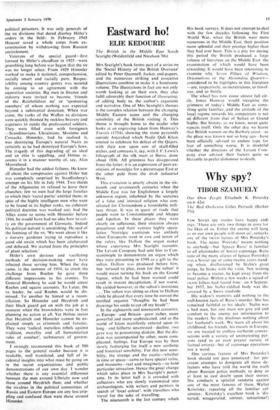Eastward ho!
ELIE KEDOURIE
The British in the Middle East Sarah Searight (Weidenfeld and Nicolson 70s) Mrs Searight's book forms part of a series on the 'Social History of the British Overseas' edited by Peter Quennell. Jacket, end-papers, and the numerous striking and evocative illustrations combine to make it a handsome volume. The illustrations in fact are not only worth looking at on their own, they also fulfil admirably their function of illustrating, of adding body to, the author's argument and narrative. One of Mrs Searight's themes is the complex relation between the changing Middle Eastern scene and the changing sensibility of the British visiting it. This theme is brought home to the reader who looks at an engraving taken from Hanway's Travels (1754), showing the stone pyramids outside Astarabad which Nadir Quli Khan erected to celebrate his defeat of the Qajars, with their row upon row of skull-filled niches, and contrasts it, say, with J. F. Lewis's lithograph of the silk mart at Bursa, done about 1836. All grimness has disappeared from the latter; it is an expression of pure ex- oticism, of nostalgia for a picturesque East at the other pole from the drab industrial West.
This exoticism is utterly absent in the six- teenth and seventeenth centuries when the Middle East was for Englishmen a largely unknown region. inhabited by the sectaries of a false and inimical religion who con- stituted for Christendom a formidable mili- tary threat. It was in quest of trade that people went to Constantinople and Aleppo and Ispahan. In these places they were clearly on sufferance, their situation always precarious and their venture highly specu- lative. Nostalgic exoticism was unlikely when Europeans went in awe and terror of the rulers, like Dallam the organ maker whose experience Mrs Searight recounts. The Levant Company had sent him to Con- stantinople to demonstrate an organ which they were presenting in 1599 as a gift to the sultan. Dallam was produced before him. but 'refused to play, even for the sultan' it would mean turning his back on the Grand Signor, which he had been warned could result in instant decapitation, if not worse. He yielded however, at the sultan's insistence ... The sultan was sitting so close to Dallam while he played that every time he moved the terrified organist "thoughte he had been drawinge his sorde to cut off my heade".'
In the eighteenth and nineteenth centuries. as Europe—and Britain—grew richer, more powerful and more sophisticated, and as the world of Islam manifestly entered upon its long—and hitherto unarrested—decline, awe gave way to patronising disdain. But the dis- dain was accompanied by other, more com- plicated, feelings. For Europe was by then slowly fashioning for itself a new aesthetic and historical sensibility. For this new sensi- bility, the strange and the exotic—whether in time or space—came to have special value, and museums—real and imaginary—to hold particular attraction. Hence the great change which takes place in Mrs Searight's panor- ama. In its latter half it is crowded with collectors who are slowly transmuted into archaeologists, with writers and painters in search of 'local colour', with travellers who travel for the sake of travelling.
The nineteenth is the last century which this book surveys. It does not attempt to deal with the few decades following the First
World War, when the British were more numerous in the Middle East, their position more splendid and their prestige higher than they had ever been. This is a pity for during this period the British produced a large volume of literature on the Middle East. the examination of which would have been rewarding. It would have been interesting to examine why Seven Pillars of Wisdom, Orientations or the Alexandria Quartet— considered to be highlights in this literature —are, respectively, so meretricious, so frivol- ous, and so brittle.
The wheel has now come almost full cir- cle. Jonas Hanway would recognise the grimness of today's Middle East as some- thing quite familiar, and the attitude of the local regime towards his compatriots is not so different from that of Sultan or Grand Sophy. But history, as we know, never quite repeats itself. Only the other day we learnt that British women on the Barbary coast—as the place was known not so long ago—have been officially advised to endure rape for fear of something worse. It is doubtful whether the directors of the Levant Com- pany ever advised their factors quite so blatantly to prefer dishonour to death.














































 Previous page
Previous page